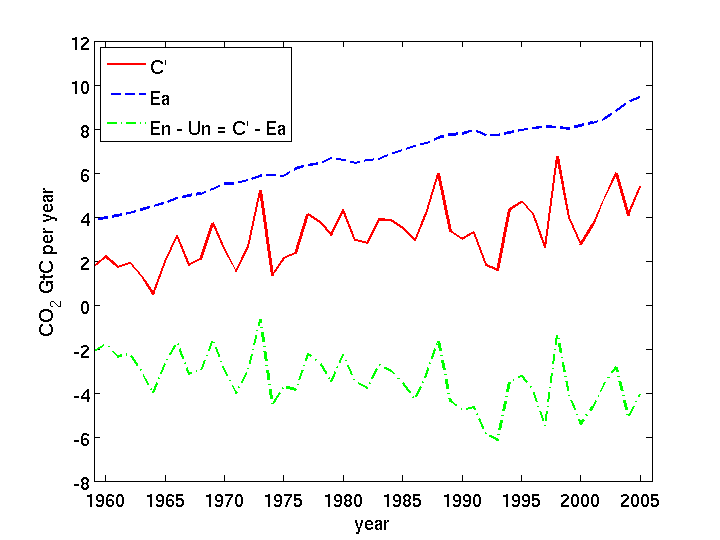
A hearty congratulations from the SkS team to our own Dikran Marsupial for getting a response to Essenhigh (2009) published.
A climate myth that crops up far more often than it should is that the rise in atmospheric CO2 since the industrial revolution is not caused by anthropogenic carbon emissions, but is instead a natural phenomenon. This has been addressed repeatedly on SkS, for example see CO2 increase is natural, not human-caused. ? An example of this argument is found in the paper "Potential Dependence of Global Warming on the Residence Time (RT) in the Atmosphere of Anthropogenically Sourced Carbon Dioxide" by Prof. Robert Essenhigh that appeared in the journal Energy and Fuels in 2009. The argument is easily refuted by the observation that the rate at which atmospheric CO2 levels are rising is less than the rate at which we are releasing CO2 into the atmosphere from fossil fuel use, which implies that the natural environment must be a net carbon sink, taking in more carbon each year than it emits.
More formally, let Ea represent annual carbon emissions from anthropogenic sources (fossil fuel use and land use change), En represent the carbon emissions from all natural sources (the oceans, soil respiration, volcanos etc.) and Un represent the uptake of carbon by all natural carbon sinks (oceans, photosynthesis, etc.), Ua would be the uptake of carbon due to anthropogenic activities, but this is essentially zero, so we can safely exclude it from the analysis. Then assuming that the carbon cycle obeys the principle of conservation of mass (any carbon emitted into the atmosphere that is not taken up by natural sinks remains in the atmosphere), the annual change in atmospheric CO2 is given by:
C' = Ea + En - Un
This can be rearranged to give an estimate of the difference between annual emissions from all natural sources and annual natural uptake by all natural sinks.
En - Un = C' - Ea
We have accurate, reliable data for the growth of atmospheric CO2 and for anthropogenic emissions (for details, see Cawley, 2011). Both of these are displayed below, along with an estimate of the net natural carbon flux En - Un. The fact that the net natural flux is negative clearly shows that natural uptake has exceeded natural emissions every year for the last fifty years at least, and hence has been opposing, rather than causing the observed rise in atmospheric CO2.

Given that this myth is so easily refuted, it is not perhaps surprising that it occurs much more rarely in scientific journals than in the media and the blogsphere, as the reviewers used by an appropriate journal are likely to be sufficiently familiar with the workings of the carbon cycle to readily identify the flaw in the reasoning (n.b. Prof. Essenhigh's paper was published in Energy and Fuels, a journal that is perhaps only tangentially concerned with carbon cycle issues).
Here at SkS, we like to be able to support our arguments with references to papers that have been published in peer-reviewed journals. Unfortunately, as far as I was aware, there were no such papers in this case; that anthropogenic emissions are responsible for the post-industrial rise in atmospheric CO2 is so self-evident that ordinarily a paper demonstrating that fact would be too trivial to be publishable. So I decided to write one! I am pleased to announce that my rebuttal of Prof. Essenhigh's paper has recently appeared in the journal:
Gavin C. Cawley, "On the Atmospheric Residence Time of Anthropogenically Sourced Carbon Dioxide", Energy & Fuels, volume 25, issue 11, pages 5503–5513, 2011.
I hope that the existence of a peer-reviewed refutation will be of some use in preventing this myth from propogating further. I hope to be able post a longer blog article at some point, setting out the arguments in more detail.
I am very grateful to the anonymous reviewers, Robert Essenhigh, Philip Goodwin, Riccardo Reitano, Nigel Franks, Andy Skuce, and John Cook for their helpful discussion and comments (sorry if I have missed anybody out) and to all at SkS generally for the work they have put in to refuting incorrect arguments that crop up in the climate debate. Thanks also to Ferdinand Engelbeen for his tireless efforts in addressing this myth in various climate blogs.
Posted by Dikran Marsupial on Thursday, 1 March, 2012
 |
The Skeptical Science website by Skeptical Science is licensed under a Creative Commons Attribution 3.0 Unported License. |